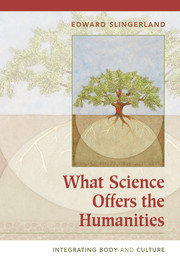Book contents
- Frontmatter
- Contents
- Figures
- Preface
- What Science Offers the Humanities
- Introduction
- PART I EXORCISING THE GHOST IN THE MACHINE
- 1 The Disembodied Mind: Problems with Objectivism
- 2 They Live Among Us: Characterizing Postmodernism in the Academy
- 3 Pulling the Plug: Laying to Rest Postmodern Epistemology and Ontology
- PART II EMBODYING CULTURE
- PART III DEFENDING VERTICAL INTEGRATION
- Conclusion
- Appendix: Embodying Culture: Selected Bibliography and Other Resources
- References
- Index
3 - Pulling the Plug: Laying to Rest Postmodern Epistemology and Ontology
Published online by Cambridge University Press: 05 June 2012
- Frontmatter
- Contents
- Figures
- Preface
- What Science Offers the Humanities
- Introduction
- PART I EXORCISING THE GHOST IN THE MACHINE
- 1 The Disembodied Mind: Problems with Objectivism
- 2 They Live Among Us: Characterizing Postmodernism in the Academy
- 3 Pulling the Plug: Laying to Rest Postmodern Epistemology and Ontology
- PART II EMBODYING CULTURE
- PART III DEFENDING VERTICAL INTEGRATION
- Conclusion
- Appendix: Embodying Culture: Selected Bibliography and Other Resources
- References
- Index
Summary
Some of the objections to postmodernism that i will explore in this chapter are more obvious than others, and they have all in one form or another been made before by critics of postmodernism – or by postmodernists themselves, for that matter. It is helpful, however, to gather these critiques together in one place to see how they fit together. I also believe that, theoretical considerations aside, the best way to thoroughly and finally put the strong postmodernist position to rest is to supplement these sorts of abstract critiques with a review of the massive amount of empirical evidence concerning human cognition that flatly contradicts the social constructivist position. Postmodernism makes many claims about human thought, language, and culture that theoretically could be true, but that, in the light of the best current evidence, appear to be false. Thought is not language, human beings are not blank slates, and all complex animals – human beings included – inhabit a world permeated by inference-rich, finely textured, and decidedly precultural structures of meaning. I will begin with a discussion of the more purely theoretical or internal problems with postmodernism, and then gradually move to problems that become most apparent in the light of empirical results coming out of the cognitive sciences.
SELF-REFUTATION AND INTERNAL INCOHERENCE
It does not require a particularly powerful analytic mind to see that strong epistemological relativism is logically problematic: to claim that no claims are true is to involve oneself in a form of the famous Cretan liar paradox (“Everything that I say is a lie”).
- Type
- Chapter
- Information
- What Science Offers the HumanitiesIntegrating Body and Culture, pp. 99 - 148Publisher: Cambridge University PressPrint publication year: 2008



